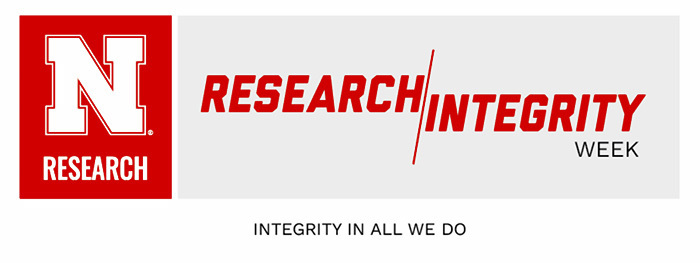Posted September 3, 2025 by Dan Moser
The inaugural Research Integrity Week is an opportunity for the Office of Research and Innovation to highlight the importance of compliance, integrity and security in carrying out the university’s research mission.
Planned for Sept. 22-26, the week’s theme is “Integrity in All We Do.”
“This is something that our office has wanted to do for a long time,” said Sara Quinn, director of research compliance, integrity and security, and deputy research integrity officer. “We’ve wanted to focus the campus on why we do the things that we do, and why integrity is so important in everything we do.”
Jen Nelson, interim vice chancellor for research and innovation, said, “It’s critical that the research we do at UNL is informed by the highest integrity, ethical standards and compliance. This week will be a good opportunity to lift up these efforts as a university and a reminder of how central they are to all we do.”
The Research, Compliance, Integrity and Security team manages several areas of compliance, including human subjects research, conflicts of interest/commitment, responsible conduct of research, export controls, research data and security, and research misconduct. Other teams, such as the Institutional Animal Care and Use Committee, manage the ethical use of animals in research and teaching.
In fact, Quinn said, all the areas within R&I and the UNL research community focus on compliance and integrity in various ways throughout the research cycle, whether through ensuring funding proposals are the best they can be to ensuring appropriate data stewardship and publication processes are followed.
Faculty sometimes might think of compliance or integrity issues as “unwanted paperwork,” said Quinn, who said the week’s activities are aimed at dispelling that idea. “We’re doing these things because they are a part of everything that we should be doing and should be thinking about as we’re conducting research, as we’re administering and receiving an award, or as we’re interacting with human subjects or animals, or conducting work in a lab or out in the field.”
The week’s activities will include university-wide emails sharing quizzes, resources questions and case studies. Two Zoom sessions – from 11 a.m.-noon Sept. 23 and 2-3 p.m. Sept. 25 – will be offered for anyone who has questions about research integrity. Registration is required.
Also, a Sept. 24 appreciation luncheon, by invitation, is planned for compliance-related committee members and staff.
Jordan Soliz, institutional official and research integrity officer, said, “People tend to engage these policies and processes when they have to, when they’re working on a project and because of that, the focus may be more on the how-to instead of the why.
“What we’re trying to do is set up a week where everyone can understand the why,” said Soliz, also a professor of communication studies.
The week is a chance to give faculty and staff an understanding of the foundation of research integrity and compliance, “as opposed to just doing it when they have a deadline coming up,” Soliz added.
Quinn said it’s also an opportunity to tear down the silos that can exist among different research fields in relation to integrity.
“We all have these responsibilities, and we all should be thinking about these things.”
Research integrity is key to public trust, Quinn said.
“Everything that we do in research is meant to inform, to improve the human condition in some way. We’re meant to publish information, to advance science, to advance understanding,” she said. “If we’re not doing that in a responsible manner, if we’re not good stewards of the resources that we’re given … then it calls into question what we’re doing.”
Quinn said she hopes Research Integrity Week becomes an annual event.
RCIS is part of R&I’s overall Research Responsibility team charged with ensuring that research is conducted with integrity and in accordance with federal regulations, state laws and institutional policies. The Research Responsibility offices provide support for the review committees, but also serve as a resource for UNL faculty, students and staff. Research Responsibility also includes the Institutional Animal Care Program, Environmental Health and Safety, and a number of special committees.
“Together, the team charged with research integrity plays an essential role in our research mission,” Nelson said.






